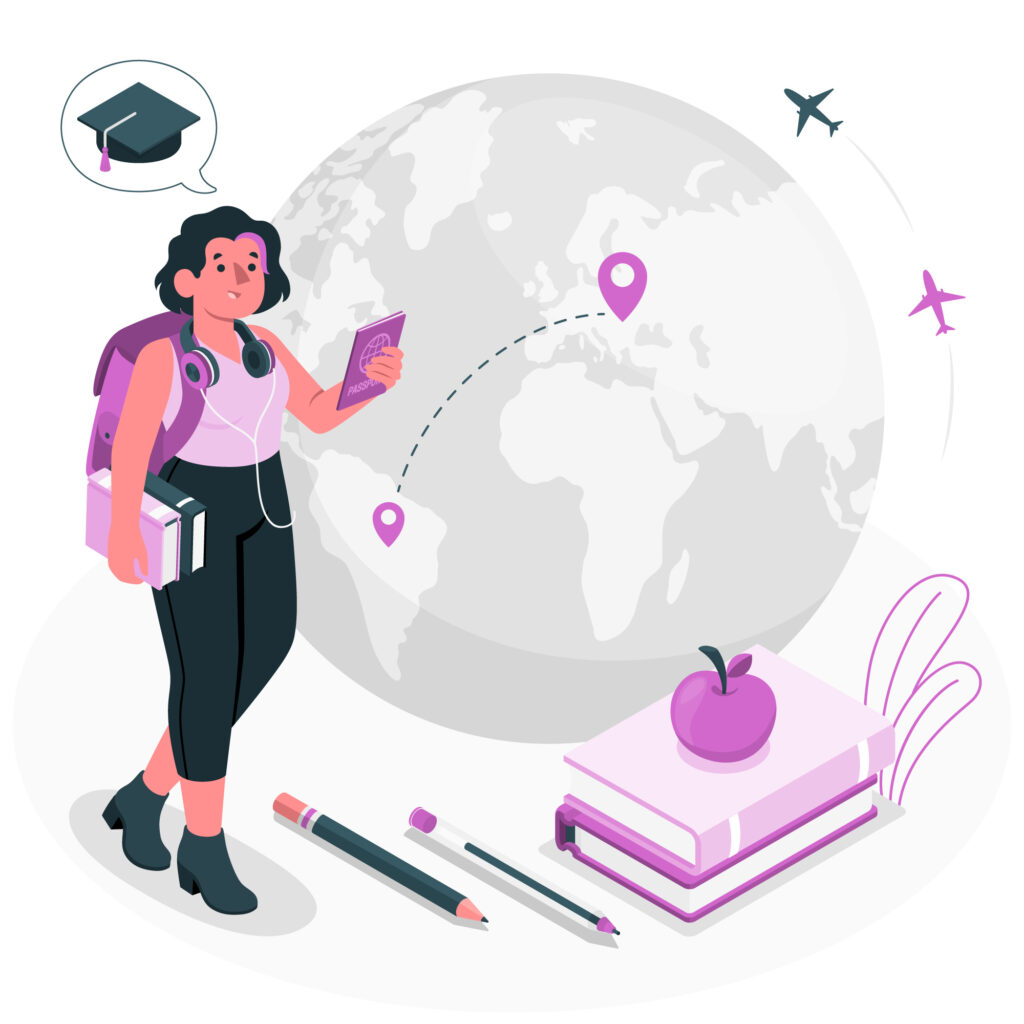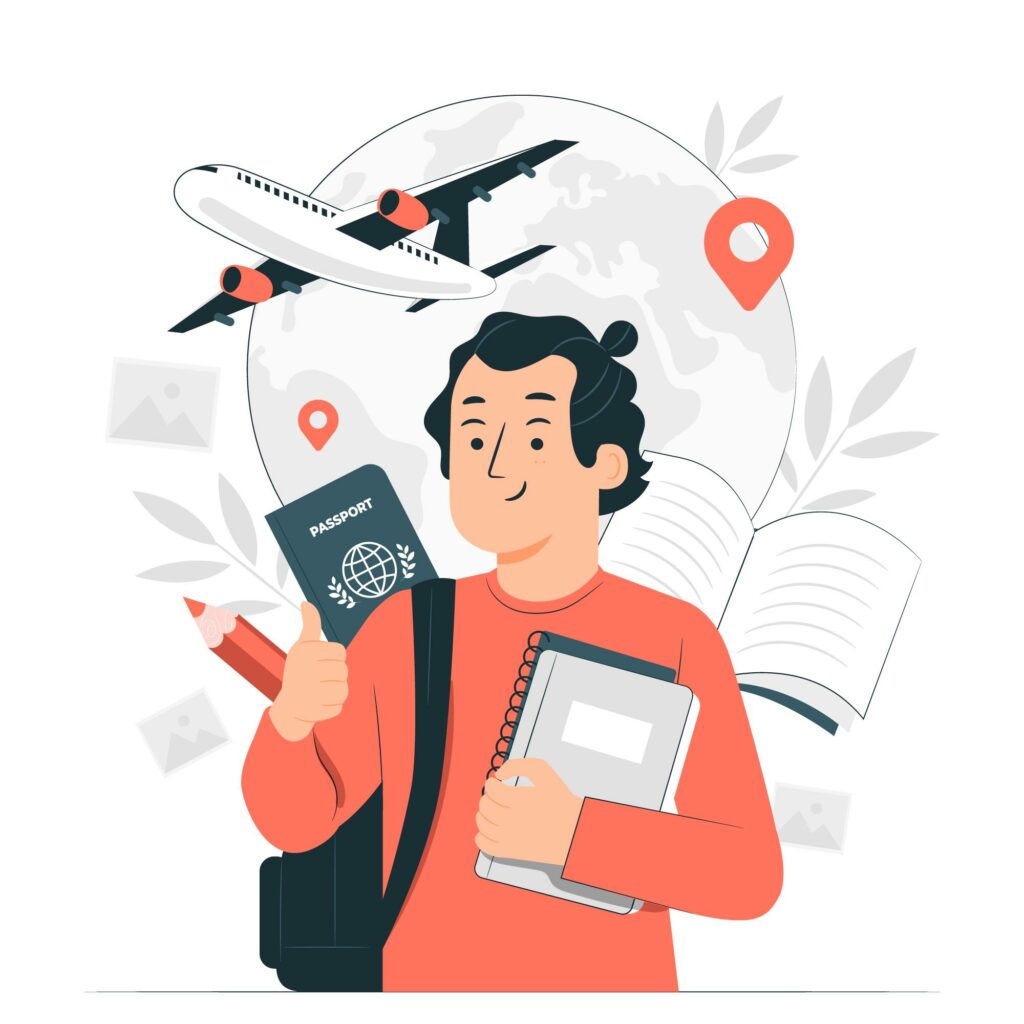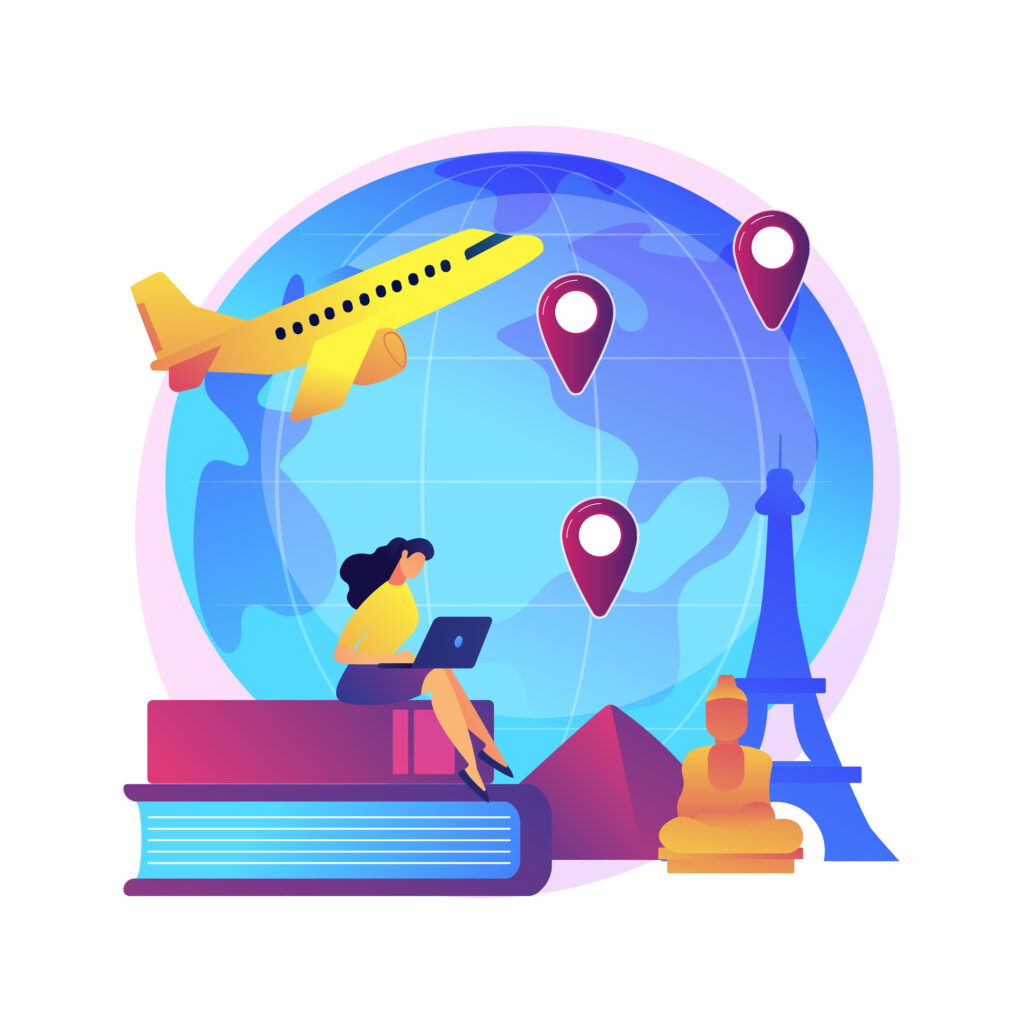Educational tourism offers unique opportunities for people to travel and learn by combining the joys of visiting new places with acquiring knowledge. This type of tourism includes various experiences such as study abroad programs, exchange student experiences, and school trips to historical sites or natural wonders. The primary goal is to enrich the learning experience, enhance cultural understanding, and nurture personal development.
As globalization continues to make the world more interconnected, educational tourism has become increasingly popular. People of all ages are eager to broaden their horizons while discovering new environments and cultures. Educational tourists also play a significant role in supporting local economies, fostering cultural exchanges, and contributing to global understanding.
Educational tourism has evolved in response to rising demand and greater availability of diverse travel experiences in recent years. From attending language schools to participating in workshops or seminars, there are endless ways to learn and grow while exploring new destinations. This growth underscores the importance of educational tourism in fostering lifelong learning and bridging cultural divides.
- Definitions of Educational Tourism
- What is Educational Tourism
- Motivations for Educational Tourism
- Popular Educational Tourism Destinations
- Suppliers of Educational Tourism
- Educational Tourism Programs and Companies
- Benefits of Educational Tourism
- Challenges of Educational Tourism
- Future of Educational Tourism
- What are the examples of Edutourism?
Definitions of Educational Tourism
Definitions of educational tourists and educational tourism are following as:
An educational tourist (or educational stayover) may be considered as:
a person who is away from their home town or country overnight, where education and learning are either the main reason for their trip or where education and learning are secondary reasons but are
perceived as an important way of using leisure time
An excursionist (or same-day educational tourist) is:
a person involved in any educational/learning activity or excursion, which does not include an overnight stay away from their home destination, and for whom education and learning is seen as an important way of using leisure time.
Therefore, educational tourism can be defined as:
tourist activity undertaken by those who are undertaking an overnight vacation and those who are undertaking an excursion for whom education and learning is a primary or secondary part of their trip.
This can include general educational tourism and adult study tours, international and domestic university and school students’ travel, including language schools, school excursions and exchange programmes. Educational tourism can be independently or formally
organised and can be undertaken in a variety of natural or humanmade settings.
What is Educational Tourism

Defining Educational Tourism
Educational tourism, also known as edu-tourism or educational travel, is a form of tourism whose primary purpose is gaining knowledge and engaging in cultural exchanges. It involves travelling to a different country or region to learn about various subjects such as history, languages, art, and environmental issues.
Education tourism isn’t limited to academic learning; it can encompass any activity or experience that enriches the traveller’s understanding of the world. The goal is to explore new places, foster personal growth, and broaden one’s perspective.
Types of Educational Tourism
Several types of educational tourism cater to different interests and age groups. Some of the most common include:
- Language Immersion Programs: These are designed for those who want to learn a new language by visiting a country where the language is spoken. The immersion environment enables participants to practice their language skills and better understand the local culture.
- Cultural Exchange Programs: These programs foster understanding and appreciation of other cultures. Participants live with host families, attend local schools or workshops, and partake in community-based activities to learn about the customs and traditions of the host country.
- Study Abroad Programs: These are popular among college and university students, allowing them to complete a portion of their degree in a different country. It promotes cross-cultural understanding, enhances global awareness, and broadens academic perspectives.
- Eco-Tourism and Sustainable Tourism: Travelers visit natural habitats and engage in activities that support their preservation and conservation. It increases environmental awareness and promotes responsible travel practices.
Educational tourism presents countless opportunities for personal development, academic enrichment, and cultural exploration. As a global phenomenon, it encourages learning from different perspectives and fosters a deeper understanding of our diverse world.
Motivations for Educational Tourism

Personal Growth
Educational tourism provides numerous opportunities for personal growth. Travellers are exposed to new environments and experiences that can foster self-discovery, adaptability, and resilience. They can develop interpersonal skills through interactions with diverse groups of people, enabling them to communicate effectively in different cultural contexts. Furthermore, participating in educational trips can also enhance critical thinking and problem-solving abilities as individuals learn to navigate unfamiliar situations.
Professional Growth
Pursuing educational tourism can significantly contribute to professional growth. Acquiring new skills and knowledge, particularly in a global context, can make individuals more competitive in the job market, set them apart from their peers, and increase their chances of employment. Additionally, some educational tourism programs provide opportunities for networking, collaboration, and exposure to industry professionals, which can result in valuable connections and insights that can propel one’s career forward.
Cultural Knowledge
Engaging in educational tourism immerses individuals in the destination country’s local culture, history, and traditions. This exposure to diverse cultures enriches travellers’ understanding of the world and broadens their perspectives. By participating in culturally immersive activities, like workshops, visiting museums or engaging with local communities, individuals can gain a deeper appreciation for and understanding of various cultural practices. This increased cultural knowledge promotes tolerance, respect, and empathy towards other cultures.
Popular Educational Tourism Destinations

Europe
In Europe, France is a top destination for educational tourism, offering cultural experiences like art galleries and museums and language immersion programs. Italy is another popular choice, known for its history, architecture, and cuisine. Students can visit famous landmarks like the Colosseum or the Leaning Tower of Pisa while learning about the country’s rich heritage. Germany is an ideal destination for learning about its technological advancements and history, with attractions like the Berlin Wall and BMW Museum. Finally, the United Kingdom offers various educational activities, including famous landmarks such as Buckingham Palace and the British Museum.
Asia
Japan is a sought-after educational tourism destination in Asia, known for its technological innovations and deep-rooted traditions. Visitors can participate in tea ceremonies, learn about samurai culture, and explore high-tech cities like Tokyo. Thailand provides opportunities for learning about Southeast Asian history, visiting temples and ancient sites, and exploring its rich biodiversity. India is another popular choice, featuring architectural wonders like the Taj Mahal, rich cultural heritage, and diverse traditions.
North America
In the United States, educational tourism spans from historical landmarks, like the Washington Monument and Ellis Island, to scientific institutions, such as NASA’s Kennedy Space Center. The US offers numerous educational activities, including visiting national parks and learning about the country’s diverse demographics.
Australia
Australia is recognized for its unique flora and fauna, making it an ideal destination for biology and ecology students. The Great Barrier Reef, the Outback, and various wildlife sanctuaries can be visited for learning opportunities in Australia.
Please note that this list is not exhaustive, and plenty of more destinations are available for educational tourism across the globe.
Suppliers of Educational Tourism
The Canadian Tourism Commission (2001) notes two main components to the supply side of educational tourism: the primary tourist product and secondary or support elements.
A variety of organisations combine to form the primary educational tourism experience, including:
- Attractions and events which provide the venue for learning experiences (e.g. parks, historic sites, zoos, bird and wildlife sanctuaries and archaeological dig sites).
- Resource specialists who are responsible for delivering the learning component of these vacations (e.g. employees, curators, interpreters, lecturers, storytellers, researchers and academics).
- Affinity travel planners from organisations who help plan and develop learning programmes for travellers (e.g. special interest groups, conservation organisations, universities and language schools).
- Tour and receptive operators who package experiences for customers and organisations and provide destination expertise, local knowledge, escort services and marketing services.
However, secondary suppliers or support services are also required for educational travellers, including:
- Transportation such as cruise, bus and train transport as part of an independent trip or package, including travel to and from the departure point.
- Hospitality services, including catering, recreation, entertainment, social activities and accommodation options.
- Travel services, including travel agents, insurance companies, travel media and advertising.
- Destination marketing organisations who operate at a national, regional or local level to promote educational travel and tourism to potential tourists.
It is the combination of primary and secondary suppliers which will create the educational tourist experience consumed by travellers. The continued development of innovative partnerships and product development is critical to the future of the educational tourism industry.
Educational Tourism Programs and Companies
Student Exchange Programs
Student exchange programs are a popular form of educational tourism, allowing students to experience other cultures and improve their language skills. These programs often involve partnerships between universities and schools in different countries. Global Volunteers and GVI Company are examples of organizations that facilitate student exchanges. Participants may stay with host families or in university dormitories, promoting cross-cultural understanding and lifelong connections.
Language Schools
Language schools are another popular option for educational tourism, providing immersive learning experiences. Students can attend classes to improve their language skills while enjoying exploring a new country. EF Tours and ACIS Educational Tours are notable companies that organize language school trips, catering to various age groups and proficiency levels. These tours can include cultural activities, excursions, and opportunities to practice conversation with native speakers.
Workshops and Seminars
Workshops and seminars provide focused learning experiences on specific subjects, usually conducted quickly. Travellers can attend workshops and seminars on topics such as art, cooking, photography, or writing, hosted by experts in the field. These educational tourism experiences often include accommodations, meals, and excursions related to the explored topic. Companies like Workshop Travels specialize in organizing these types of trips, offering unique educational opportunities alongside cultural experiences.
Educational Tours Companies
Educational tour companies often offer tailor-made itineraries for school trips and excursions, providing students with hands-on experiences in various subjects. Examples include exploring historical landmarks, visiting museums, and participating in local customs and traditions. EF Tours, ACIS Educational Tours, and School Excursions are well-known companies that arrange these trips for schools and universities. Packages range from short one-day outings to multi-week adventures catering to diverse educational needs and interests.
In summary, educational tourism programs and companies cater to various learning experiences and fields of interest, offering unique travel opportunities for students, educators, and travellers.
Benefits of Educational Tourism

Broadening Cultural Experience
Educational tourism immerses travellers in diverse cultures, art, history, and architecture. This exposure leads to a deeper understanding and appreciation for different ways of life. Tourists broaden their perspectives by visiting historical landmarks, engaging with local communities, and participating in cultural activities. Exploring unique landscapes and learning foreign languages also contribute to culturally enriching experiences.
Enhancing Education and Teaching
Through educational tourism, individuals can enhance their knowledge and skills by learning from experts in various fields. Incorporating hands-on experiences in subjects like history, art, and architecture provides a more engaging and memorable educational journey. As a result, such incidents often stimulate a lifelong passion for learning and a greater appreciation for diverse subjects. Furthermore, educators can bring back valuable insights, tools, and teaching methods to enrich their classrooms and contribute to improved teaching practices.
Boost to Employment and Business
Educational tourism creates a demand for skilled professionals in the tourism industry. This demand increases employment opportunities for local guides, translators, and educators. Moreover, the influx of travellers contributes to the growth of local businesses such as hotels, restaurants, and entertainment venues. Education tourism strengthens the foundation for sustainable growth within the global community by fostering cultural exchange and economic development.
Challenges of Educational Tourism
Impact on Local Cultures
Educational tourism offers the opportunity to learn about new cultures and societies but can also significantly impact these communities. Over-tourism can lead to commodifying cultural experiences, with locals feeling pressured to adjust their traditions and customs for tourist consumption. This can result in losing crucial cultural heritage, a decline in authenticity, and socio-cultural tensions between visitors and local populations.
Furthermore, tourists’ motivation to learn about new cultures may sometimes result in intrusive behaviour. The desire to explore and understand can lead to an invasion of privacy or violations of personal boundaries, creating resentment within the local community.
Environmental and Social Issues
Another challenge of educational tourism is the ecological footprint it leaves behind. As tourists travel to remote destinations, they often generate environmental issues such as pollution, littering, and depletion of natural resources. These actions can endanger the ecosystems on which local communities rely for their livelihoods.
Additionally, educational tourism can exacerbate social inequality. Wealthier tourists can consume resources, push up the cost of living, and drive up housing prices in popular destinations, making it increasingly difficult for locals to afford necessities.
To minimize the negative impacts, tourists and educational institutions must be conscious of their actions and strive for sustainable and responsible tourism practices.
Future of Educational Tourism
Global Trends and Growth
Educational tourism is gaining rapid prominence in the global tourism industry, driven by the increased number of international students, researchers, and individuals exploring new places for learning. The year-on-year growth of educational tourism has been remarkable, indicating its significance and potential for the future of educational tourism. The compound annual growth rate (CAGR) of educational tourists globally is expected upward.
With more diverse modes of transportation available, travelling for educational purposes is becoming more accessible to individuals worldwide. As a result, global educational tourists are anticipated to grow exponentially over the coming years. Dark tourism has also garnered attention as an educational sub-sector among the various niche segments. It involves visiting sites associated with death, tragedy, or adverse historical events, encouraging tourists to learn about critical aspects of human history.
International Collaborations
In the age of globalization, international collaborations have become the cornerstone for promoting educational tourism. Universities and academic institutions worldwide have recognized the benefits of global exposure through partnership programs, research initiatives, and exchange opportunities for students and faculty. These collaborations foster cultural exchange, promoting understanding different perspectives and contributing to academic advancements.
International students, in particular, play a pivotal role in boosting educational tourism’s global reach. With increasing interest in studying abroad, greater acceptance of different cultures, and the opportunities offered through international collaborations, international student mobility is expected to rise. Consequently, educational tourism will continue to thrive and evolve, enriching people’s lives with the experiential knowledge they acquire through travel and tourism.
What are the examples of Edutourism?

Educational tourism, also known as “edutourism” or “academic tourism,” involves travel experiences designed to provide participants with opportunities for learning, cultural enrichment, and personal growth. Here are some examples of educational tourism:
- Museum Tours: Travelers visit museums, art galleries, science centres, and historical sites to learn about art, history, science, and culture. Guided tours, interactive exhibits, and informative displays help visitors gain insights into various subjects.
- Cultural Exchange Programs: These programs facilitate interactions between travellers and local communities. Participants engage in homestays, language immersion, and cultural workshops to understand different cultures and traditions firsthand.
- Historical Site Visits: Travelers explore historical landmarks, ancient ruins, and heritage sites to learn about past civilizations, events, and architecture. These visits provide insights into the historical context of a region.
- Language Learning Trips: Participants travel to destinations where the target language is spoken. Language immersion programs offer classes, cultural activities, and opportunities to practice language skills in real-life settings.
- Culinary Tours: Travelers explore the local cuisine, visit markets, and participate in cooking classes to learn about food traditions, ingredients, and cooking techniques of a particular region.
- Eco-Tourism and Sustainability Tours: These tours focus on ecological conservation, sustainable practices, and environmental awareness. Participants learn about local ecosystems, wildlife, and efforts to protect the environment.
- Educational Workshops and Retreats: Travelers attend workshops, seminars, and retreats related to personal development, wellness, and skill enhancement. These events provide opportunities for learning new skills and self-improvement.
- Educational Cruises: Cruises often offer onboard lectures, workshops, and field excursions that provide travellers with educational experiences while visiting multiple destinations.
- Academic Conferences and Seminars: Professionals, researchers, and students attend conferences and seminars to present and discuss research findings, share insights, and engage in academic discussions.
- Volunteer Tourism (Voluntourism): Travelers engage in volunteer activities, such as teaching, community development, or conservation efforts, while experiencing the local culture and gaining insights into societal challenges.
- Wildlife and Nature Tours: Participants explore natural habitats, observe wildlife, and learn about biodiversity, conservation, and ecological systems through guided tours and excursions.
- Adventure-Based Learning: Adventure activities such as outdoor expeditions, trekking, and team-building exercises provide opportunities for personal growth, leadership development, and experiential learning.
- Educational Farm Stays: Travelers stay on farms to learn about agriculture, animal husbandry, and sustainable farming practices. They may participate in farm activities and gain an appreciation for rural life.
- University or School Exchange Programs: Students participate in exchange programs to study abroad, gaining exposure to different educational systems, cultures, and perspectives.
- Archaeological Expeditions: Participants join archaeological digs to learn about ancient civilizations and the process of excavation and preservation.
Educational tourism offers participants a chance to learn beyond traditional classroom settings, fostering cultural understanding, personal development, and a broader worldview. The activities and experiences can vary widely, allowing travellers to choose options that align with their interests and learning goals.